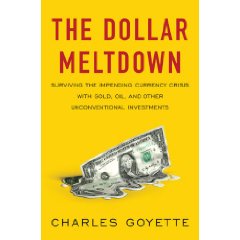Charles Goyette has spent much of his life thinking about money. He has contemplated how it works, how governments manipulate it, and how it stores value.
Goyette, a radio show host, precious metals pro, and libertarian, shares his views on fate of the US dollar in “The Dollar Meltdown.” In his four-part book, Goyette details where the US economy and dollar are now, how we got here, what might happen next, and how to protect your money.
The topics Goyette presents are necessary reading for anyone wanting a well-rounded perspective on the current US economy. Even if you don’t agree with some of Goyette’s strong libertarian viewpoints, his colorful writing and factual anecdotes make “The Dollar Meltdown” an interesting read.
As its cover might imply, “The Dollar Meltdown” isn’t a gentle introduction to the collapse of the dollar. Libertarians and Austrian school aficionados would feel most at ease with this book. Refreshingly, the nonpartisan author implicates both Democrats and Republicans as fiscal and monetary ne’er do gooders.
Goyette says “the body economic is shuddering from the relentless compulsions of meddlers.” Thanks to government intervention in money and markets, the US faces runaway inflation. Between Sept 2008-March 2009, US monetary base grew 199%. Add the domestic dollar supply to foreign dollar reserves—up to half of US dollar reserves are in foreign hands—and you have a potential oversupply.
The country’s debt situation is making holders of dollars, both foreign and domestic, nervous about the value of their greenbacks. Goyette writes that our national debt adds up to $42,000/person for the bailout (March 2009 numbers). On top of that, China owns $767 billion in US Treasury securities. That’s the equivalent of each individual American borrowing $3,300 from people in China.
If people start dumping dollars, all that extra supply will make it back to the US. Inflation will result. Several countries are already seeking other kinds of reserves—euros and gold, for example—to replace dollars.
Why isn’t the government quaking in its boots? Because, says Goyette, it has always pursued inflation as a policy. Authorities aim for mild inflation as a manageable economic state. The government tries to alter deflationary states into inflation to gain a sense of control of the economy. “Helicopter” Ben Bernanke is doing exactly that right now. Moreover, as the country’s biggest debtor, the government benefits most from inflation. For example, at 4% inflation, a debt of $12 trillion depreciates by $480 billion/year.
Economic gyrations actually work well for politicians, because they can capitalize off the consequences of inflation. They can campaign based on economic woes. Inflation can help them get reelected. It also helps the government increase its own power. After the government produces inflation, it will initiate wage and price controls. It will use inflation as a vehicle to move towards central command (total economic control).
Goyette, a free-market proponent, says authorities can never be one step ahead of the economy. Inflationary policies aren’t good for the economy. “Saying some inflation is desirable is like saying a few termites are a good thing…,” he remarks.
To combat the wealth-destroying effects of runaway inflation, Goyette recommends you put 25% of your portfolio into gold and silver, ideally physically held. He offers expert, detailed advice on how and where to buy it. Goyette’s chapter on buying gold is one of the most cohesive and useful chapters in his book. His expertise in the field shines through.
Subsequent chapters aren’t as well-defined, but do offer detailed background information on each recommended investment. The next chapter talks about silver. Chapters on investing in oil, natural resources, commodities, bonds (using a long inverse strategy), and foreign currencies follow.
Analysis
At times, I found the book dogmatic. For example, throughout the book, Goyette mentions that America is transforming itself into a central command economy. He says command economies produce poverty. Fair enough.
But isn’t China, increasingly prosperous as it is, still a command economy? Goyette addresses this by saying that “as China freed its command economy, growth came.” Yes, but that doesn’t mean China is free from command. Nor does it mean that America won’t stop the top-down action until it becomes the USSA. This tendency to polarize marks some of his claims. What’s more, Goyette later recommends buying an ETN (exchange-traded note) issued by the (socialist) government of Sweden. We hate central command, but we support it when it’s in our own interest?
If you can get over a couple of belief-system rabbit holes, and the occasional divisive language—Ron Paul fans would claim it as fact, but if your belief system lands on the outskirts, Goyette can shock—“The Dollar Meltdown” is a worthy read. It covers a perspective you need to know about in an entertaining, interesting way.
Full disclosure: We were sent a free copy of The Dollar Meltdown.

